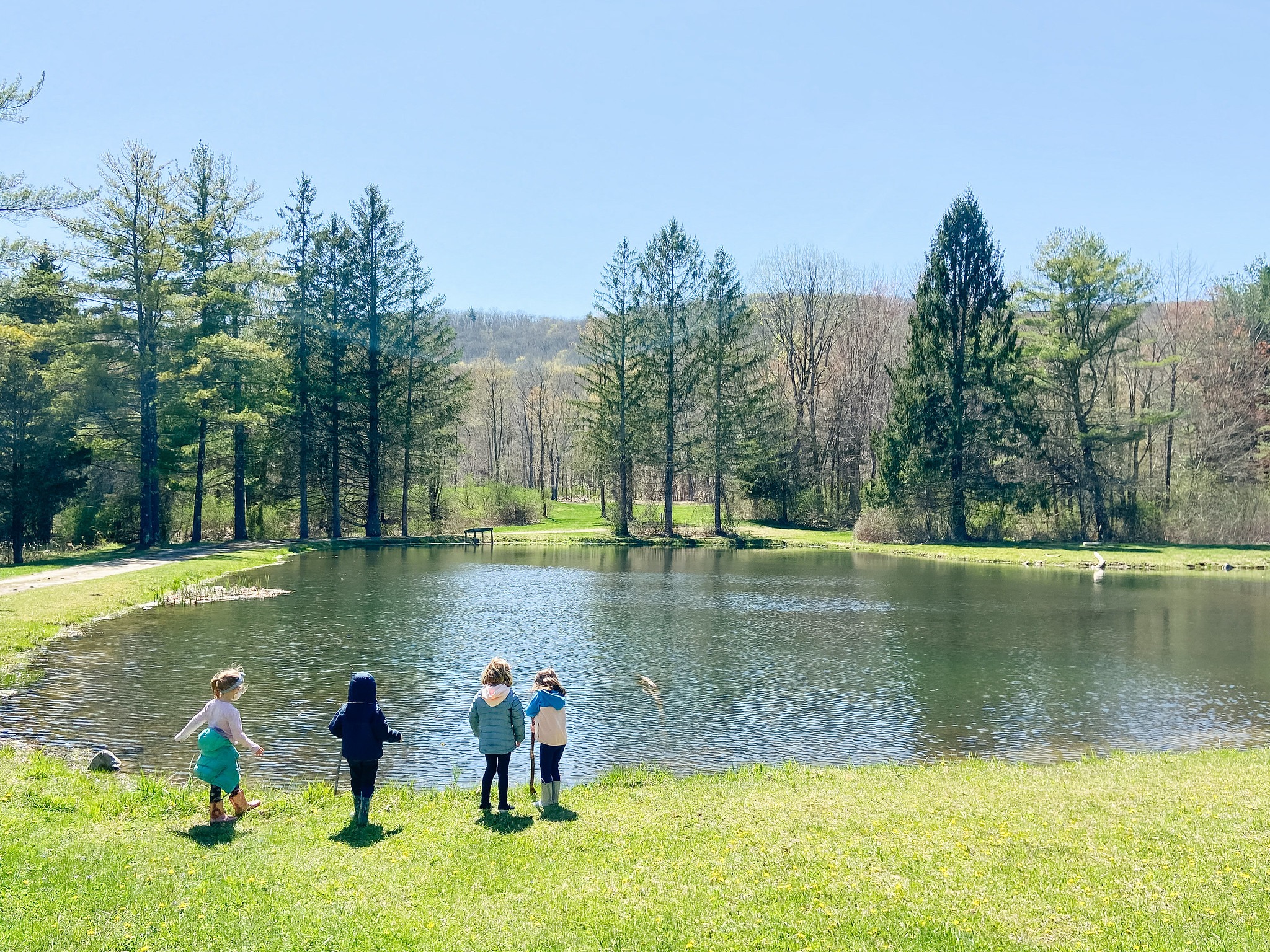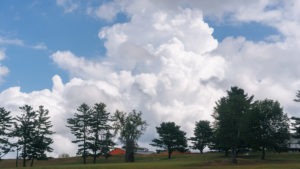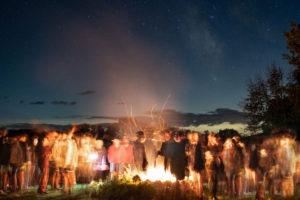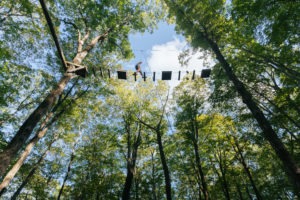Stewardship and the Sublime: A Vision for Sustainability at IMS
Posted on October 13, 2022 by Indian Mountain School

Through the course of several talks with the IMS community this fall, Tom Stewart, Director of Sustainability Programming and Initiatives, is sharing a vision for sustainability at IMS. Below is Mr. Stewart’s first discourse, on stewardship.
Stewardship is the word for acting with the obligations and responsibilities of a steward. So what is a steward?
I’ll jump right in here and mention the thing that many of you are probably thinking. “Weird that that word sounds a lot like his last name.” So let me explain. My last name is one of those that comes from the name of an occupation – in this case the old medieval Scottish job of house-steward. The job-title comes from the combination of two old words: stig, meaning something like “home” or “house” and weard, meaning “keeper” or “guardian”, so sort of like a property care-taker. But in medieval Scotland, stewards did more than just maintain the physical structures and grounds of the homes of important families. They were also in charge of caring for the animals, managing the land’s production and, in many situations, were even responsible for the safety and security of the members of the noble family themselves.
Of course the concept of being a steward or of stewardship did not originate in medieval Scotland; it existed long before that and is found in nearly every culture in the world.
In f
Nor is stewardship new to IMS. As many of you are aware, the founder Mr. Riggs’ original idea was to have a school dedicated to learning as much from the land as from books. In addition to studying Latin, and geography, and history, the early students on this campus studied soil, and the life-cycle of things that grow from the earth, and how to care for a variety of animals. And from that time to now, the school has held up caring and service as a core tenet of its philosophical grounding.
So what does it mean to be a steward these days, and what does stewardship mean in a modern, broad sense?
The starting point is that concept of being a care-taker – but just like in indigenous cultures and in medieval Scotland, it is more than just caring. It is about caring that is rooted in a sense of connection and in a sense of responsibility.
Why do we care for some things more than others? There are some obvious things like familiarity and perceived value that make us care, but I want to look at something not typically considered, but I think is extremely important and maybe the core of it all, and that is beauty, or more precisely, our ability to appreciate beauty.
When I say “beauty” I’m not thinking of the surface attractiveness of things and people we normally associate with that word, but something far deeper. As some of you know, I have a daughter who is studying philosophy at university and last year she was talking with me about a paper she was writing about truth, beauty, and something referred to as the sublime. According to one dictionary the sublime “inspires deep veneration, awe, or uplifting emotion because of its beauty, nobility, grandeur, or immensity.” This is not your everyday encounter with something pretty, but rather that occasional experience that you find moving or amazing in some way — a double rainbow, an incredible sunset, or the sun shimmering through trees glazed after an ice-storm.
Why focus on beauty and this word “sublime” in a sustainability talk about stewardship?
It is because opening ourselves up to experiencing the sublime, this kind of beauty, allows us fleeting glimpses into how we are all connected to the awe-inspiring world we inhabit and through that recognition we get a view into how we are all connected to one another.
There are many, many ways to find such beauty and truth. The sublime is literally everywhere.
Scratch the surface of any science and you will find the sublime. Exploring physics reveals comprehensible laws that govern the universe, laws that dictate what happens at the core of a sun and in the atoms of your finger tips – amazing! The study of astronomy might put you under the arc of a night lit by billions of stars and as you glance through the edge of the Milky Way galaxy, you rotate and revolve through limitless space at nearly 900,000 mph. 
Beauty and truth, of course, are rightfully seen as the domain of the arts – human-made echoes of the sublime that surrounds us. A drawn line that perfectly describes its subject; a line of poetry that somehow conveys the poet’s sense in a set of words that at first glance seems far too inadequate; an actor’s voice that delivers truth in the midst of the stage’s artifice; the magic universality of the harmonies and notes of music.
It is found in other endeavors as well. Athletics is, from the arc of a soccer shot, to a perfect ski run, to the return of a serve, the astounding intersection of human physiology and those same laws that describe the orbit of planets. The story of a team coming together over a course of a season, or an individual so in tune with their own biology that they can act with complete precision and control under pressures that would defeat everyone around them. The sublime is found in these things, too.
Maybe most importantly the sublime is found in the tremendous acts of compassion, endurance, selflessness and care that appear throughout the story of humanity and that have been the true driving force of its progress. Yes, that story is also filled with pain, fear, suffering, and cruelty, but there is clear evidence that the long moral arc is in fact bent by those acts of humanity, and not by inhumanity. And it follows that in our own histories we personally progress through our acts that echo and harmonize with the truth and beauty we see around us. Where we fall short is in the moments when we lose our sense of connection and forget where our responsibilities lie.
So, open up to the sublime. Be ready to recognize it. That is a very tall order these days. In some ways we seem made to not to see it. We are built for distraction. Our twitchy reactions to deviation from the routine was our salvation once, and kept us from being eaten by faster and stronger animals. But even now, safe at the apex, we struggle to move past responding to only the most immediate stimulæ. In our wired, networked world it seems nearly impossible to find a slow, quiet moment, and the sublime takes time, requires patience and stillness. 
Here is what I hope for us all – that every day we are witness to something amazing. Right now that might be ambitious, but open yourself up to it at least once a week to start. Maybe you step outside on a night so filled with stars that you’re pretty sure you can see your shadow by their light. Maybe you watch an uncommon moment of compassion enacted by someone you barely know. Maybe you are amazed to learn about the way that trees communicate with each other through the mycelium network beneath them, or about the intelligence of octopuses. Maybe you are awed by stories of people sitting at a drugstore counter waiting to be served, or how a math formula on a page can describe the arc of a bridge. Whatever it is, be open to seeing it.
If we can begin to regularly recognize the everyday sublime (which I suppose is a contradictory phrase), the kind of caring for the planet and its inhabitants that is needed today and for the future will follow without a doubt.
We protect what we care about. We care about things we value. We value things we find unique and amazing, beautiful and true – the sublime. If we do not seek to become stewards of our planet, we each run the risk of unthinkingly acting from not only an anthropocentric, a human centered, position of privilege that disregards the rest of the biosphere, but also a “now-centric” privilege that does not consider generations yet to come. And we also run the risk of failing to recognize the injustices rooted in the nexus of extraction, gain, and future and current climate suffering. We all must look for connection and embrace our responsibility.
Those Scottish stewards, those care-takers, they eventually became kings and queens. I’m not exactly sure what meaning that has, but I think it means something. And so does the example that indigenous people set – by not having a word for it.
Maybe the meaning is just this: Rise up and become a care-taker leader. Be humble and become an indistinct part of that which you seek to save. Look for that truth and beauty. Be amazed by it all. Be guardians of our sublime home, our world.